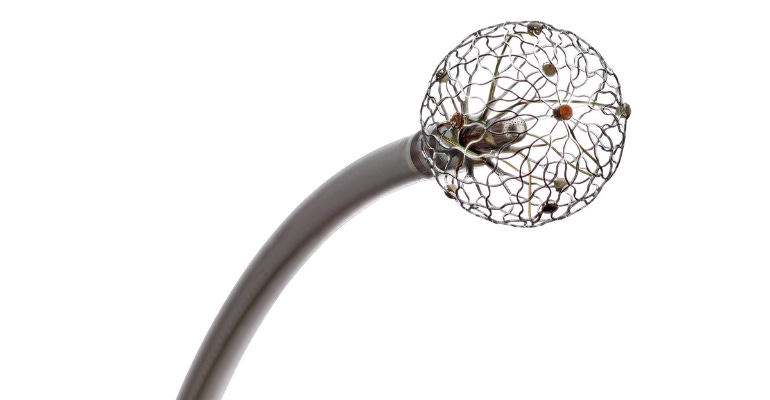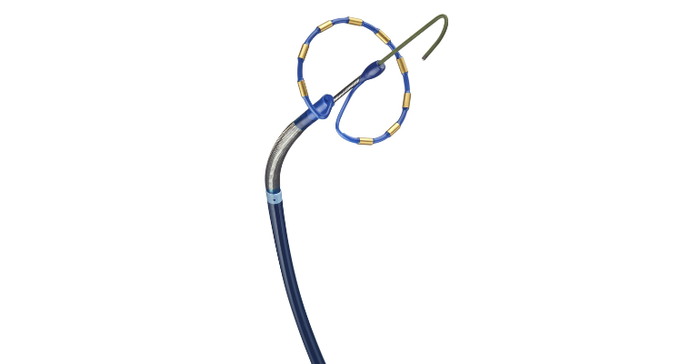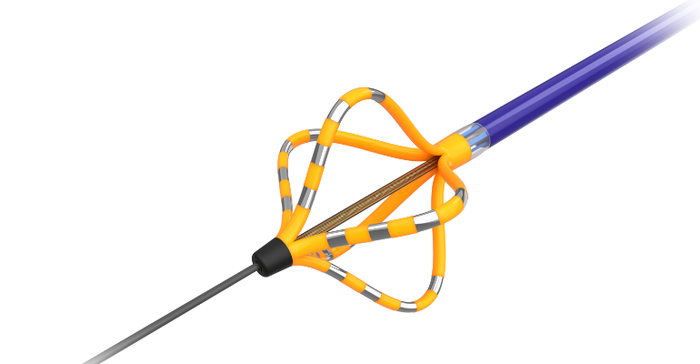Medtronic, J&J, and Boston Scientific Jockey for Pulsed Field Ablation Market Share
Medtronic is emerging as a front-runner in pulsed field ablation with a new regulatory approval, but Boston Scientific and Johnson & Johnson are hot on its heels.
March 16, 2023

Pulsed field ablation (PFA) has been touted as a promising new ablation modality for the treatment of atrial fibrillation (AF) – and Medtronic just hit an important regulatory milestone in the space.
The company reported Wednesday that it has received a CE mark for its Affera mapping and ablation system, which includes the Sphere-9 catheter and the Affera Prism-1 mapping software. Together, Medtronic said the full system creates a new paradigm in electrophysiology through the integration of the Sphere-9 pulsed field ablation, radiofrequency (RF), and high-density mapping catheter, which maps and ablates atrial arrhythmias (fast, abnormal heart rhythms) and provides real-time feedback through mapping and navigation software.
The Affera mapping and ablation system will be commercially available beginning in the first half of 2023 in Europe, the company said. Medtronic acquired Affera in August 2022.
What sets Sphere-9 apart in the pulsed field ablation space?
The Sphere-9 catheter, coupled with the integrated mapping and navigation system, is designed to quickly generate sophisticated electro-anatomical maps allowing the physician to deliver wide-area focal ablation lesions of choice between RF or pulsed field ablation, based on the patient and procedure needs. Given its size, the all-in-one catheter's nitinol 9mm ablation tip has the potential to require fewer focal ablation lesion applications that may result in lower procedure times than standard irrigated ablation catheters, Medtronic said. The mapping software is designed to enable an optimized user experience by delivering streamlined insights and feedback to support procedure performance.
"The revolutionary Affera mapping and ablation system combined with the Sphere-9 catheter represent a great advancement in the field of HD mapping and focal ablation," said Khaldoun Tarakji, MD, vice president and chief medical officer for Medtronic’s cardiac ablation solutions business. "Current technologies require the use of separate HD mapping and ablation catheters. The ability to map, ablate, and validate with the Sphere-9 catheter enables the physician to eliminate the need to exchange catheters and empowers them to choose the energy source, whether RF or PF, based on the patient's needs. All this leads to improving efficiency and most importantly, enhancing the safety of ablation procedures for our patients."
Medtronic announced in December that enrollment was completed in Affera SPHERE Per-AF, a randomized, controlled FDA investigational device exemption pivotal trial. That trial, designed to evaluate the safety and effectiveness of the Affera mapping ablation system for the treatment of persistent atrial fibrillation, is currently in its 12 month follow up phase.
Competition in pulsed field ablation is quickly heating up
Treating AF with ablation (electrophysiology/EP) is an $8 billion market with a long runway, according to Travis Steed, a medtech analyst at Bank of America. Steed estimates that only about 15% of the eligible 2.5 million U.S. patients with AF are currently being treated with ablation (worldwide, around 650,000 ablations versus 35 million patients with AF, he notes).
In a February 24 report, Steed wrote that pulsed field ablation looks to be safer and faster and could potentially revolutionize the way ablations are done today and expand the market. The key question comes down to data, as PFA must continue to prove durability and safety in line with thermal-based options such as radiofrequency ablation (RF) or cryoablation, which is the current standard of care, the analyst notes.
"Our doc conversations suggest that physicians want to see data on each platform as all PFA systems are not created equal," Steed wrote.
So, it's no wonder Medtronic, Johnson & Johnson, and Boston Scientific are all jockeying for market share in pulsed field ablation. There are also three private companies developing PFA technology: Kardium, Galvanize, and Adagio.
"Thought leaders continue to express enthusiasm for the potential benefits of PFA, although there remains plenty of debate on how safe, effective, and quick the technology is compared to current thermal-based options, which PFA device is best and easiest to use, and what the future direction of cardiac catheter ablation will be," Marie Thibault, a medtech analyst at BTIG, wrote in a report following the annual AF Symposium in February.
Thibault notes that there are still questions to be answered about this new technology class, such as how much more effective current iterations of pulsed field ablation systems will be in providing patients with sustained freedom from atrial arrhythmias, which PFA device will deliver the best outcomes and be easiest to use, and which cases are most optimal for [PFA] use over RF or cryoablation.
"Within PFA specifically, we think the market may be somewhat fragmented based on physician preference for using a focal vs single-shot catheter, having an integrated electro-anatomical mapping system, and having combined PF/RF or PF/cryo capabilities," she wrote. "This may also be dependent on the patient being treated and ablation strategy (paroxysmal vs persistent, pulmonary vein isolation (PVI) alone vs PVI + posterior wall, mitral isthmus line, etc.)."
Thibault also noted that PFA is enjoying early commercial success in Europe. For example, Boston Scientific's Farapulse PFA device (acquired in 2022) drove EP business growth 40% internationally in the fourth quarter of 2022. San Carlos, CA-based Galvanize Therapeutics also has CE mark for paroxysmal AF and Thibault relays that the European launch is going very well, with hundreds of patients treated in the first couple of months.
PULSED AF safety and data findings
Medtronic recently presented long-term data from the PULSED AF study at the 2023 American College of Cardiology Scientific Sessions & Expo (ACC.23). The prospective, multi-center, non-randomized, unblinded study is designed to evaluate the safety and effectiveness of Medtronic’s PulseSelect pulsed field ablation system for the treatment of atrial fibrillation.

The PULSED AF study exceeded its performance goal of freedom from a composite of serious procedure and device-related adverse events with a 0.7% (p=0.002) rate of primary adverse events in both patient cohorts. There were no esophageal events, instances of pulmonary vein stenosis, or phrenic nerve injury.
PULSED AF exceeded the threshold for efficacy performance at 66% efficacy in paroxysmal AF patients and 55% in persistent AF patients (p50% (paroxysmal) and >40% (persistent) at 12 months. The PULSED AF primary effectiveness endpoint included a composite of measures based on efficacy endpoints across multiple studies of radiofrequency and cryoablation energy sources. The composite endpoint included freedom from acute procedural failure, arrhythmia recurrence, repeat ablation, direct current cardioversion, left atrial surgery, or antiarrhythmic escalation through 12 months, excluding a three-month blanking period.
Freedom from atrial arrhythmia recurrence at 12 months was 70% in the paroxysmal cohort and 62% in the persistent. Additionally, clinical success, freedom from recurrence of any symptomatic atrial arrhythmias, was 80% for paroxysmal and 81% for the persistent cohort.
Mike Matson, a medtech analyst at Needham & Co., shared his thoughts on the PULSED AF trial in a report issued March 6, shortly after the results were presented.
"Overall, we believe that these results seem to support the view that while PFA may offer improved safety when compared to thermal ablation, its efficacy appears similar to thermal ablation," Matson wrote.
Comparing the PULSED AF results to the Johnson & Johnson inspIRE results and the Boston Scientific MANIFEST results on an "apples-to-apples" basis in terms of patient monitoring, Matson noted that PULSED AF showed similar efficacy to inspIRE and better efficacy than MANIFEST.
In addition to the PulseSelect pulsed field ablation system and the Sphere-9 PFA catheter, Medtronic also has the SpherePVI.
PFA technologies are expected to be adopted quickly, as so far, they seem to be faster and safer than thermal ablation approaches, and the single-shot approach to PVI is likely to take charge from cryoablation, Thibault wrote.
"Whether efficacy will be improved is still an open question," she noted. "We remain bullish on PFA as a technology class and note there are several other public and private players developing competing approaches."
While Medtronic could beat Boston Scientific to market with PulseSelect and have a broader label, Steed noted that Medtronic's existing cryoablation business will also likely be cannibalized.
"Cryo is generally viewed as the quicker and simpler procedure vs RF (cryo is single shot unlike conventional RF point-by-point). However, future point-by-point PFA launches will be more competitive to RF," Steed wrote.
Within Medtronic's pulsed field ablation pipeline, Steed notes that the biggest differences between PulseSelect and Affera is that PulseSelect is sing shot and Affera is point-by-point with mapping, and it can toggle between PFA and RF.
"Electrophysiology is evolving at a rapid pace, and we believe we are uniquely positioned to be category creators once again with the all-in-one Sphere-9 catheter, just as we did when Medtronic pioneered cryoablation technology," said Rebecca Seidel, president of Medtronic’s cardiac ablation solutions business. "Along with the PulseSelect PFA system, we are proud to be among the first to bring novel single shot and focal PF technologies to patients around the world."
Boston Scientific has CE mark for Farapulse and expects to present its U.S. pivotal data (ADVENT trial) in the second half of the year with U.S. launch projected for early 2024. Boston Scientific also initiated the ADVANTAGE trial for persistent AF and expects data in 2024 or beyond.

J&J's pulsed field ablation device could be on the U.S. market in 2024, Steed noted. The analyst also said that Abbott is developing a PFA device but has not disclosed much on timing.
Private PFA Players
Vancouver, British Columbia-based Kardium also hit a milestone this week. The company said the first patients have been treated in its PULSAR clinical study, which will evaluate the safety and effectiveness of the company's Globe pulsed field ablation system. The international, multicenter study trial has been greenlit by regulatory bodies in the United States, Canada, and Czech Republic.
The PULSAR study is expected to enroll more than 400 patients for treatment at up to 35 sites in the United States, Canada, and Europe. Vivek Reddy, MD, (Mt. Sinai Hospital, New York, NY) and Atul Verma, MD (McGill University Health Centre, Montreal) are the principal investigators on the study. The first patients were treated at Na Homolce Hospital, Prague, by Reddy, Petr Neužil, MD, PhD, and Jan Petru, MD.
Kardium said the study expands on the first-in-human trial (PULSE-EU) of 69 patients treated with the Globe System. The initial results of the PULSE-EU study were recently published in Journal of the American College of Cardiology: Electrophysiology. These results demonstrated 100% acute PVI and 100% durable isolation at three-month remapping in patients who received an optimized PFA dose.
“From our experience with the PULSE-EU study, we have found the Globe System can provide a rapid and durable treatment of atrial fibrillation and has so far demonstrated exceptional rates of effectiveness,” said Reddy, director of cardiac arrhythmia services for The Mount Sinai Hospital. “I am excited to begin treating patients in the PULSAR [investigational device exemption] study.”
The Globe System features a catheter with 122 gold electrodes, each of which can map a patient's cardiac anatomy and electrical activity and deliver PF energy to the heart, Kardium said.
“The Globe System’s capabilities to deliver rapid PVI and customized PF lesions outside of the pulmonary veins, combined with high-definition mapping and real-time tissue contact maps, allow me to deliver a comprehensive treatment to patients,” said Verma, MD, associate professor at McGill University, McGill University Health Centre. “The PULSAR study will expand our knowledge in the exciting and rapidly developing field of PF.”
In October 2022, Laguna Hills, CA-based Adagio Medical announced its first pulsed field cryoablation (PFCA) procedure performed using the Adagio CryoPulse catheter system as part of the PARALELL trial. The procedure was performed at St. Antonius Hospital Nieuwegein, Netherlands by Lucas Boersma, MD, PhD, a professor at Amsterdam University Medical Center, and a co-principal investigator of the trial.
“PFCA is a unique ablation modality consisting of a 30-second ultra-low temperature cryoablation (ULTC) cycle with pulsed field ablation (PFA) delivered at the very end of the cycle using a single catheter system,” Boersma said. “The recent trial of ULTC established a new benchmark of ablation effectiveness in persistent AF with reported 85% freedom from AF after a single procedure, and the PARALELL trial will test the performance of PFCA against that benchmark, with additional benefit of shorter ablation times. In addition, the trial design allows for randomization of patients to PFCA or PFA, delivered by the same catheter to create identical sets of lesions with similar characteristics.”
The ablation procedures in the PARALELL trial will be performed using the first generation of Adagio’s CryoPulse PFCA catheter in combination with PFA and iCLAS cryoablation consoles. The iCLAS cryoablation system for treatment of paroxysmal and persistent AF as well as atrial flutter is already on the market in Europe. The safety and effectiveness of the iCLAS system for the treatment of persistent AF are being evaluated in an FDA investigational device exemption trial in the United States. The Adagio Medical clinical trials portfolio also includes the Cryocure-VT trial, which is evaluating safety and performance of the vCLAS ULTC catheter system for treatment of monomorphic ventricular tachycardias.
“PFA has recently captured the attention of the EP community with the expectation of achieving safer and faster procedures based on the selective effect on the myocardium as compared to currently dominant point-by-point RF ablations, and multiple PFA systems are currently undergoing clinical evaluations,” said Verma, who is co-principal investigator of Adagio's trial (in addition to Kardium's trial). “Physiologically, PFCA builds on the tissue selectivity of PFA by focusing electrical fields into a target myocardial tissue, pre-treated by short-duration ULTC to increase lesion depth and ensure transmurality, and by forming the isolating layer of ice between the electrodes and the blood. As a result, microbubble showers, phrenic nerve capture, and muscle contractions observed in traditional PFA are effectively eliminated. So, in effect, we are taking advantage of the benefits of ULTC and PFA collectively, while minimizing their individual disadvantages.”
Olav Bergheim, president and CEO at Adagio Medical, said the company's immediate goal is to use the results of the PARALELL study to obtain CE mark for the first-generation CryoPulse catheter system, thus putting all three ablation modalities, ULTC, PFA, and PFCA "at the fingertips of every electrophysiologist, first in Europe and eventually worldwide.”
About the Author(s)
You May Also Like



.png?width=300&auto=webp&quality=80&disable=upscale)
